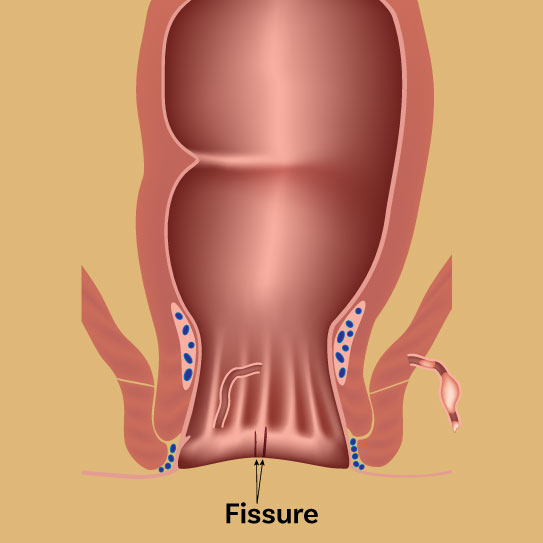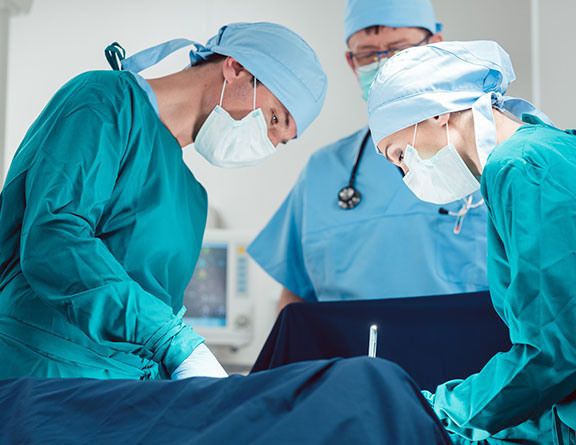What is the need for anal fissure treatment?
An anal fissure is a crack or tear around the anal region. It causes immense pain and sometimes bleeds. The usual healing period for fissures is 6 weeks. Most people who have fissures firstly try conservative treatment, natural remedies, and lifestyle changes. In most cases, these methods are effective, but for some people, they don’t provide expected results. But fearing that they might have to undergo surgery, people continue trying these ineffective methods that result in chronic fissures.
If fissures reach the chronic stage, they can increase the risk of sentinel pile, anal stenosis, and anal fistula. When anal fissures are not treated for a long time, they can also cause significant damage to the anal sphincter muscles leading to incontinence. The worst thing is that fissures can also increase the risk of developing anal cancer.
To prevent these complications, it is crucial that you seek proper treatment for fissures as soon as possible.
Get Advanced Laser Fissure Treatment in Jammu at Pristyn Care
In Jammu, Pristyn Care provides advanced laser treatment for fissures. We understand that patients always have a hard time choosing between surgical and medical treatment. The traditional surgical procedures are invasive, require hospitalization, take 2-4 weeks for recovery, and cause excruciating pain. Therefore, Pristyn Care leverages modern laser technology which is safer and effective than traditional open surgery. It is superior to the conventional treatment methods in various aspects, such as:
- Laser surgery is a non-invasive procedure.
- It doesn’t cause any kind of pain during or after the treatment.
- It promotes tissue regeneration that allows the fissure to heal faster.
- There is minimal downtime as the patient recovers completely within 2-7 days.
- Laser treatment allows the patient to resume daily activities from the next day.
- It is done on an outpatient basis, hence, no need for hospitalization.
- Laser surgery also preserves the anal sphincter function.
- It has minimal chances of bleeding, infections, and other complications.
Due to all these benefits, the patients feel convinced that laser surgery is the most certainly best treatment method for fissures. To learn more about the procedure and benefits of laser technology, you can get in touch with Pristyn Care doctors.
Consult with Pristyn Care’s Highly Experienced Fissure Doctors in Jammu
Pristyn Care doctors are at your service so that you can get optimal medical care without any compromise. We house the most dedicated and certified team of proctologists and general surgeons who have more than 8 years of experience. Our doctors have been providing both medical and surgical treatment for fissures and other anorectal diseases for a very long time.
Our doctors have had special training in performing laser-assisted procedures. Thus, you can rely on their expertise and discuss all possible treatment options with them without any hassle. Along with creating the ideal environment where the patient feels safe, our doctors listen to their specific needs and clear all their doubts regarding the treatment.
Solely due to the skills and expertise of our doctors, the success rate of laser fissure surgery at Pristyn Care is over 90%. So, don’t hesitate to get in touch with us. Book an appointment with any of our doctors and consult with them to resolve fissures permanently.
Undergo Surgery At A Pristyn Care-Associated Hospital/Clinic in Jammu
To make the advanced treatment accessible for everyone who needs it, Pristyn Care has joined hands with the top hospitals and clinics. We are working in partnership with these healthcare centers that have state-of-the-art facilities and modern technologies. These medical centers also follow the necessary safety guidelines and protocols laid by WHO for protection against COVID-19.
You can visit any of the nearest hospitals or clinics and undergo laser fissure surgery without any risk. Our medical and non-medical staff will ensure your safety during the treatment. Alongside, we will also make sure that your surgical experience is seamless and you go home completely satisfied.
Schedule An Appointment with Experts at Your Convenience
Pristyn Care follows a patient-centric approach and focuses on simplifying the surgical experience of the patients. Hence, we have implemented a simple and straightforward method to schedule an appointment with expert doctors. To book an appointment, you can choose any of the following ways:
- Give us a call on the number given at the top and our representatives will communicate with you to schedule an appointment at your specified date and time.
- You can fill the “Book Appointment” form and submit it. Our medical coordinators will get back to you shortly and you can specify the date and time for consultation.
- Download our dedicated Patient mobile application that shows the list of doctors associated with Pristyn Care. You can see that list and pick a doctor of your choice for consultation.
One other feature that Pristyn Care provides to make everything convenient for the patients is online consultation. By choosing the online consultation mode, the patient doesn’t need to visit the clinic instead they can discuss the problem with the doctors from their home or office with full confidentiality.
How to relieve fissure itching?
Here are a few simple tips that can help you relieve fissure itching:
- Don’t scratch the fissure area. Scratching may irritate the skin. To find relief from the condition, you can apply compression to the area or take an oatmeal bath. You may want to scratch the area while in your sleep, so you should trim your nails to prevent hurting your area.
- Wear breathable cotton underwear. Wearing cotton undergarments will help you keep your area dry. Avoid wearing pantyhose and tight fit inner garments because it may trap moisture and irritate the skin.
- Clean your anal area gently – Use clean lukewarm plain water to your clean your anus. Use non-irritating mild soap. Do not scrub the area near your anal fissure. Make sure to clean the area with moist cotton balls or plain water if you have diarrhea or incontinence.
- Avoid irritants – Do not use anything like perfumed soaps, bubble baths, genital deodorats, or harsh wipes in and around your anal fissure. If you need to clean your fissure area, use unscented toilet paper.
- Watch your diet – Cut down on your intake of coffee, cola, spicy foods, citrus fruits, tomatoes or any food that may cause diarrhea. Don’t indulge in laxative overuse
- Use gels and ointments – You can use zinc oxide gels or ointments, vaseline petroleum jelly or hydrocortisone cream to find quick relief from the itching and irritating symptoms.
- Maintain firm bowel movements – Adding a lot of fiber to your regular diet can help you pass soft and timely bowel movements. For smooth bowel movements, you can also take help of fiber supplements such as psyllium (Metamucil) and methylcellulose (Citrucel).
What is the difference between anal fissure and anal fistula?
Anal fissure and anal fistula are two very common anorectal diseases. An anal fissure is a condition where an tear or a crack appearns in the skin near the anus. On the other hand, anal fistulas are tube-like passages that appears in the anal canal or the inner rectum. Most anal fissures are like paper cuts and ususally get healed within a few weeks. If left untreated, both anal fissure and anal fistula can develop into worse conditions. Untreated fistulas can even branch off into multiple openings.
The symptoms exhibited by both the conditions are very similar to each other. Pain in the anal area, discomfort while seating at the toilet seat and pain while passing a bowel movement, and blood in stools are some of the common symptoms for both anal fissure and anal fistula. But anal fistulas may also include pus secretion from the anal area, an extra opening near the anus or an increase in diarrhea.
Although different in nature, both the conditions require medical intervention. An anal fissure or anal fistula can be treated by a proctologist or an anorectal/ colorectal surgeon. At initial stages, both the diseases can be managed with medicines. But to treat the condition permanently, one would require a surgical approach, which can be done either through open surgery or laser surgery.






Pristyncare%20Clinic.webp)


.svg)









